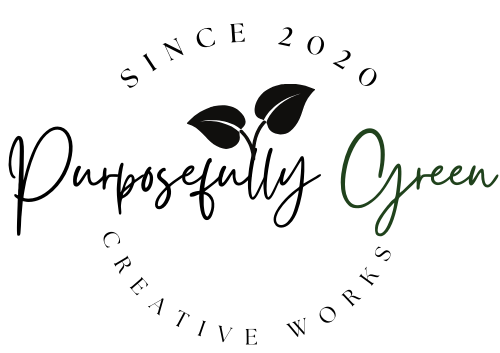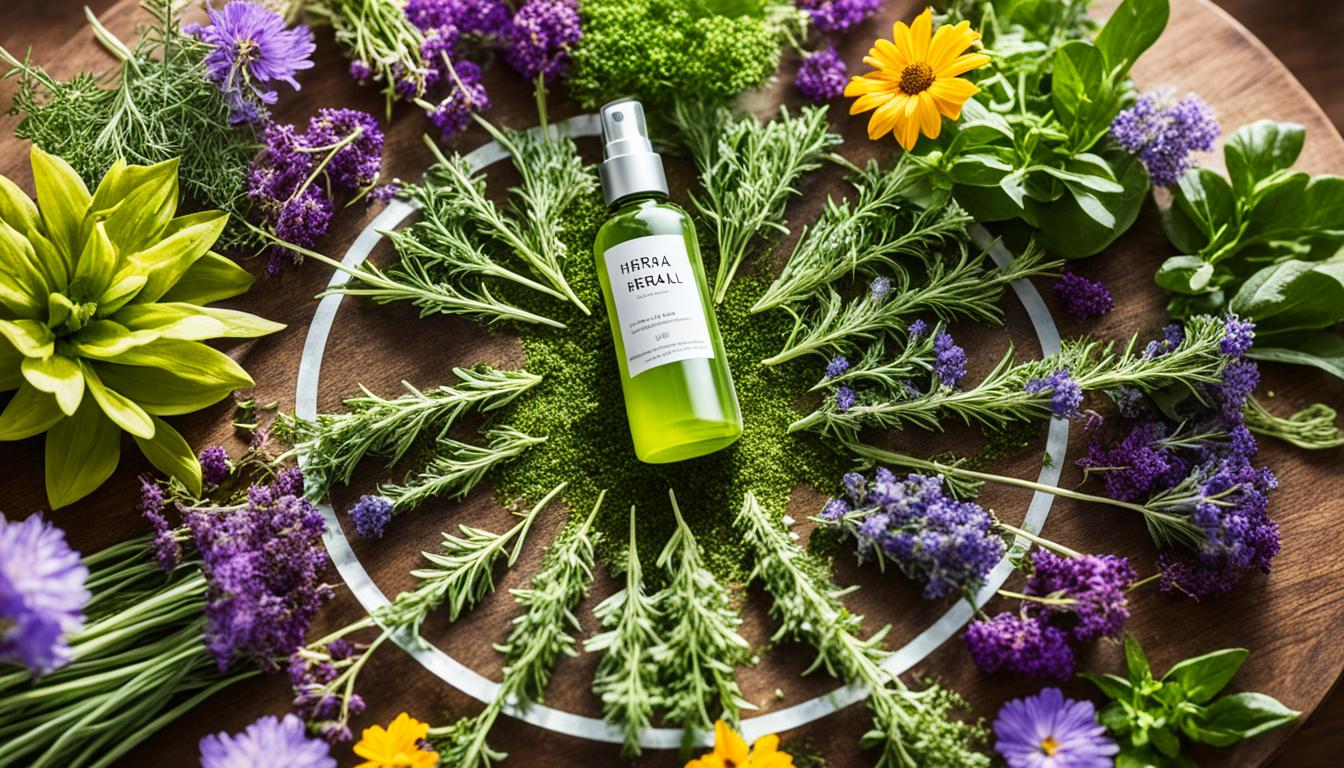Greetings! Today, I’m excited to share with you the wonderful world of DIY herbal hair perfumes. If you’re looking for a natural and fragrant way to enhance your tresses, homemade hair scents are the answer. Say goodbye to the artificial and hello to the power of herbal hair care.
Commercial perfumes may smell great, but they often come with a downside. Their high alcohol content can dry out your hair, leaving it dull and lifeless. That’s where DIY herbal hair perfumes come in. By using essential oils and other natural ingredients, you can create aromatic hair remedies that provide not only a delightful fragrance but also nourishment for your locks.
So, why should you venture into the world of DIY hair perfume? Let me break it down for you. For starters, you have complete control over the ingredients. No more guessing what’s in that bottle! By making your own hair perfume, you can ensure it’s a non-toxic alternative.
Now, you might be wondering how to create these delightful scents. Well, fret not! I’ve got you covered. In this article, I’ll be sharing DIY hair perfume recipes, tips on choosing the right essential oils, and the benefits of using different carrier ingredients. By the end, you’ll be well-equipped to create your very own herbal fragrances for your hair.
But first, let’s dive deeper into the world of DIY herbal hair perfumes and discover what makes them so special. Are you ready? Let’s get started!
Key Takeaways:
- DIY herbal hair perfumes provide a natural and non-toxic alternative to commercial perfumes.
- Essential oils and carrier ingredients are the key components in creating homemade hair scents.
- Choosing the right essential oils based on their nourishing properties and classification into top, middle, and base notes is important.
- Carrier ingredients such as vodka, witch hazel, aloe vera gel, or jojoba oil help dilute the essential oils and create a hair perfume spray.
- DIY hair perfumes can be customized to suit different hair types and address specific hair concerns.
The Benefits of DIY Herbal Hair Perfumes
DIY herbal hair perfumes offer a multitude of benefits for your hair care routine. Not only do they provide a natural and captivating fragrance, but they also promote healthier and nourished tresses without the drying effects of alcohol-based commercial perfumes. By harnessing the power of essential oils, you can create customized scents that cater to your personal preferences while indulging in the therapeutic properties they possess.
One of the major advantages of DIY herbal hair perfumes is the avoidance of toxic chemicals often found in commercial products. By opting for a non-toxic alternative, you can protect your hair from potential harm while enjoying a natural fragrance that is gentle on both your tresses and the environment.
Essential oils, the key ingredient in DIY hair perfumes, have additional nourishing benefits that can improve the overall health and appearance of your hair. Different essential oils offer various properties, such as promoting hair growth, reducing dandruff, balancing oil production, or adding shine. By carefully selecting essential oils suitable for your specific hair needs, you can enhance the effectiveness of your hair care routine.
Creating a well-balanced and long-lasting scent is crucial when making DIY hair perfumes. This is achieved by incorporating different notes: top, middle, and base. Top notes are the initial scents that dissipate quickly, followed by middle notes that provide body and balance to the fragrance. Finally, base notes linger for a longer period of time, ensuring a lasting and captivating aroma.
Choosing the perfect essential oils:
- Select a combination of essential oils that complement each other, representing top, middle, and base notes.
- Consider your hair’s needs when choosing essential oils. For example, lavender and rosemary are known for their calming and growth-promoting properties, while ylang ylang and sandalwood are beneficial for damaged or brittle hair.
By creating your own DIY hair perfume, you have complete control over the ingredients used, allowing you to cater to your specific hair care goals and preferences. You can adjust the concentration of essential oils, experiment with different combinations, and craft a scent that reflects your unique personality.
Next, we will discuss how to choose the right carrier ingredient and share a delightful homemade recipe for herbal hair perfume that will leave your locks smelling divine.
“DIY herbal hair perfumes offer a natural and customizable alternative to commercial perfumes, providing nourishing benefits for your hair while enveloping your locks in a captivating fragrance.”
How to Choose Essential Oils for DIY Hair Perfumes
When it comes to creating your own DIY hair perfumes, selecting the right essential oils is crucial. Not only do essential oils provide a delightful fragrance, but they also offer nourishing benefits for your hair. Here’s what you need to know about choosing the perfect essential oils for your DIY herbal hair perfumes.
Nourishing Benefits of Essential Oils
Different essential oils offer a range of nourishing benefits for your hair. Some oils are known for promoting hair growth, while others can help reduce dandruff or add shine to your locks. Examples of essential oils with nourishing properties for your hair include:
- Lavender
- Rosemary
- Chamomile
- Tea tree
- Lemon
- Peppermint
- Ylang ylang
- Rose
- Sandalwood
These essential oils can work wonders for your hair, addressing specific concerns and enhancing the overall health and appearance of your tresses.
Essential Oil Classification: Top, Middle, and Base Notes
Another essential factor to consider in DIY hair perfumes is the classification of essential oils into top, middle, and base notes. These notes contribute to the overall scent and longevity of your hair perfume.
Top notes are the initial scents you detect in the perfume blend, and they tend to fade rather quickly. They provide the first impression of the fragrance, creating an enticing aroma.
Middle notes form the body of the scent and offer a harmonious balance. They come after the top notes and contribute to the overall complexity and appeal of the fragrance.
Base notes are the foundation of the scent and linger for a longer period of time. They provide depth and ensure that the fragrance lasts throughout the day.
By incorporating a combination of top, middle, and base notes, you can create a well-rounded and long-lasting hair perfume.
Creating Your DIY Hair Perfume Blend
When crafting your DIY hair perfume blend, consider combining various essential oils to achieve your desired scent profile. Experiment with different ratios of top, middle, and base notes to find the perfect balance. Keep in mind your hair type and personal preference as you create your unique fragrance.
“The art of blending essential oils is an exploration of scent and personal expression.”
Essential Oil Chart for DIY Hair Perfumes
| Top Notes | Middle Notes | Base Notes |
|---|---|---|
| Lemon | Lavender | Patchouli |
| Bergamot | Ylang ylang | Cedarwood |
| Orange | Rosemary | Sandalwood |
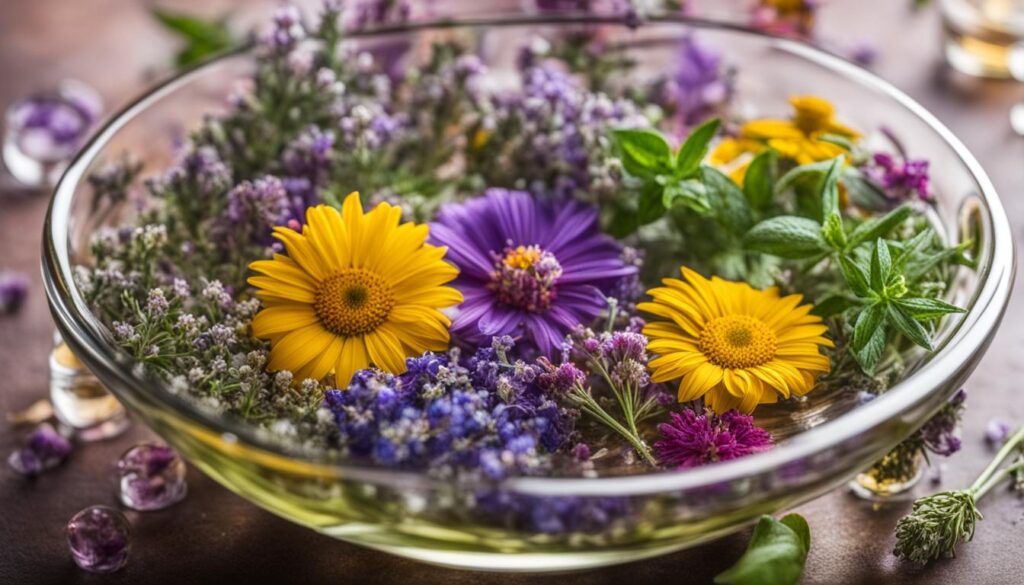
Use this chart as a starting point for your DIY hair perfume blend. Feel free to mix and match essential oils from different categories to create a unique and captivating fragrance.
Remember, the choice of essential oils is a personal and creative process. Explore different combinations, experiment with scents, and have fun discovering the perfect blend that reflects your style and makes your hair smell amazing.
Choosing the Right Carrier Ingredient for DIY Hair Perfumes
A carrier ingredient is a crucial component in DIY hair perfumes as it helps dilute the essential oils and allows them to blend seamlessly with water. When selecting a carrier ingredient, it’s essential to consider its impact on the scent and your hair type. Let’s explore some popular carrier ingredients and their properties:
Vodka
Vodka is a common choice as a carrier ingredient due to its ability to enhance the fragrance of essential oils. However, it’s important to note that vodka can have drying effects on the hair due to its alcohol content.
Witch Hazel
Witch hazel is another popular option as a carrier ingredient. It evaporates quickly and provides a pleasant scent to DIY hair perfumes. However, like vodka, it can also be drying to the hair.
Aloe Vera Gel
If you’re looking for an alcohol-free and non-drying option, aloe vera gel is a great choice. It effectively emulsifies essential oils with water without compromising the scent or causing dryness. Aloe vera gel can also provide additional nourishment to the hair.
Jojoba Oil
For those with hair that tends to be weighed down easily, jojoba oil is an excellent carrier ingredient. It closely mimics the scalp’s natural sebum, making it lightweight and non-greasy. Jojoba oil won’t compromise the natural hair scent and is suitable for various hair types.
The choice of carrier ingredient ultimately comes down to personal preference and hair type. Consider the drying effects, desired hair scent, and the added benefits each carrier ingredient offers before making your selection.
Now that we’ve explored carrier ingredients, let’s move on to creating your very own DIY hair perfume blend.
Homemade Hair Perfume Recipe with Essential Oils
To create your own signature hair perfume using essential oils, follow this simple homemade hair perfume recipe. With just a few ingredients, you can customize a delightful scent that will leave your hair smelling amazing all day.
Ingredients:
- Essential oils of your choice (recommended ratio: 30% top notes, 50% middle notes, 20% base notes)
- Carrier ingredient (vodka, witch hazel, aloe vera gel, or jojoba oil)
- Distilled water or rose water
Instructions:
- Combine the essential oils in the desired ratio to achieve your preferred scent. For a well-balanced fragrance, use 30% top notes (such as bergamot or lemon), 50% middle notes (such as lavender or rosemary), and 20% base notes (such as cedarwood or sandalwood).
- Add the carrier ingredient to the essential oil mixture. Vodka and witch hazel are popular choices as they enhance the fragrance without weighing down the hair, while aloe vera gel and jojoba oil provide nourishment and moisture.
- Slowly pour in distilled water or rose water to dilute the mixture and give it a liquid consistency. The amount of water added will depend on personal preference and desired strength of the scent.
- Using a swirling motion, mix all the ingredients together until well combined. This will ensure that the essential oils, carrier ingredient, and water are evenly distributed.
- Transfer the hair perfume to a dark, glass bottle. The dark glass will help protect the oils from light and maintain the potency of the fragrance.
- Store the hair perfume in a cool, dry place to preserve its scent. Avoid exposure to direct sunlight or heat, as this can cause the oils to degrade.
- Before each use, gently shake the bottle to mix the ingredients and activate the scent.
With this homemade hair perfume recipe, you can enjoy the benefits of a customized fragrance that is free from harmful chemicals. Let your hair exude a delightful natural scent wherever you go!
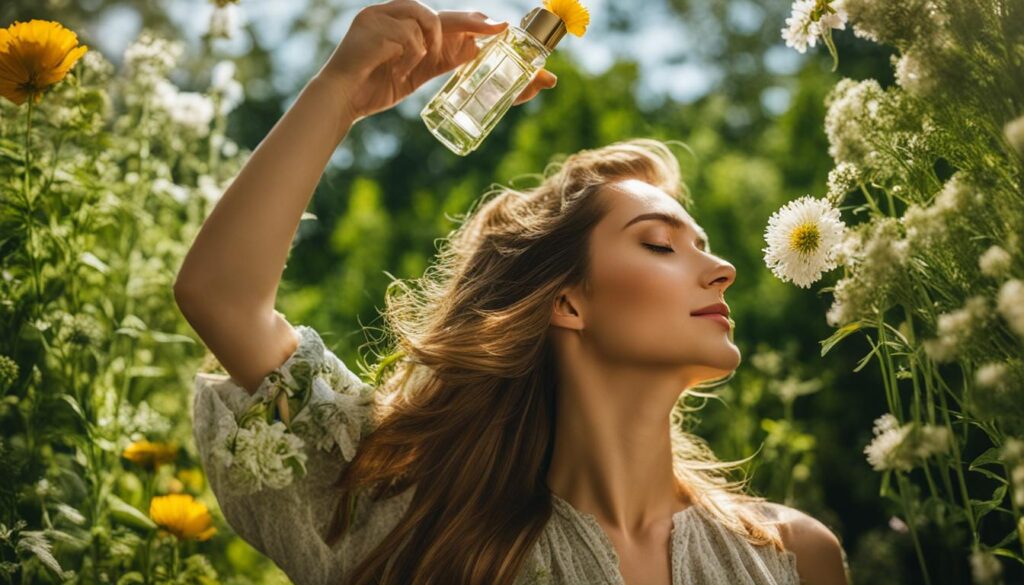
| Ingredient | Properties |
|---|---|
| Essential oils | Provide fragrance and nourishing benefits for the hair. |
| Carrier ingredient | Dilutes the essential oils and enhances the fragrance without drying out the hair. |
| Distilled water or rose water | Dilutes the mixture and gives it a liquid consistency. |
How to Use DIY Herbal Hair Perfumes
To enjoy the benefits of DIY herbal hair perfumes, follow these simple steps:
- Shake the bottle gently: Before each use, give your homemade hair perfume a gentle shake to mix the ingredients thoroughly.
- Apply to the lengths of hair: Spray the hair perfume directly onto the lengths of your hair, avoiding the roots if desired. This will evenly distribute the fragrance and ensure it lasts throughout the day.
- Versatile for wet or dry hair: Whether your hair is wet or dry, this hair perfume spray can be used to freshen up unwashed hair for a pleasant scent boost or to enhance the fragrance of freshly washed hair.
- Long-lasting fragrance: The DIY herbal hair perfume will provide a long-lasting fragrance that lingers on your tresses. If desired, you can reapply the perfume as needed throughout the day to maintain the scent.
Using DIY herbal hair perfumes is a simple and enjoyable way to add a fresh and personalized scent to your hair. Experience the natural fragrance and nourishing benefits of homemade hair perfumes by incorporating them into your hair care routine.
Testimonial:
“I love using DIY herbal hair perfumes! They are so easy to make and leave my hair smelling amazing all day long. I simply give the bottle a shake, spray it on my hair, and enjoy the long-lasting fragrance. It’s a wonderful addition to my hair care routine!” – Jessica, DIY enthusiast
Benefits of DIY Hair Perfumes Over Commercial Perfumes
DIY hair perfumes offer numerous advantages over commercial perfumes. Unlike commercial perfumes, DIY hair perfumes are alcohol-free, ensuring that they won’t dry out your hair. This is particularly beneficial for those with dry or brittle hair who want to avoid further damage caused by alcohol-based products.
Another major advantage of DIY hair perfumes is that they provide a non-toxic alternative to commercial perfumes. By creating your own hair perfume using natural ingredients such as essential oils and carrier ingredients, you can avoid the potentially harmful chemicals found in many commercial perfumes. This is especially important for those with sensitivities or allergies to synthetic fragrances.
Aside from their non-toxic nature, DIY hair perfumes also offer nourishing properties for the hair. The essential oils used in these perfumes can provide additional benefits beyond just fragrance. For example, certain essential oils like lavender and rosemary have been traditionally used for their hair-strengthening, scalp-soothing, and dandruff-reducing properties.
DIY hair perfumes offer a natural and customizable alternative to commercial perfumes. By using essential oils and carrier ingredients, you can create personalized and nourishing scents for your hair.
Creating your own hair perfume allows you to have control over the ingredients, enabling you to tailor the scent to your preferences. You can experiment with different essential oil blends, adjust the strength of the fragrance, and even mix and match to create unique combinations. This level of customization ensures that your hair perfume reflects your personal style and enhances your overall hair care routine.
| Benefits | DIY Hair Perfumes | Commercial Perfumes |
|---|---|---|
| Alcohol content | Alcohol-free, won’t dry out the hair | High alcohol content may dry out the hair |
| Chemicals | Non-toxic, made from natural ingredients | May contain synthetic fragrances and harmful chemicals |
| Nourishing properties | Essential oils provide additional benefits for the hair | Fragrance-focused, minimal hair care benefits |
| Customization | Can create personalized scents | Limited customization options |
By opting for DIY hair perfumes, you can enjoy the benefits of a natural fragrance, avoid potentially harmful chemicals, and nourish your hair with essential oils. This holistic approach to hair care provides a refreshing alternative to commercial perfumes, allowing you to embrace a healthier and more personalized way to scent your locks.
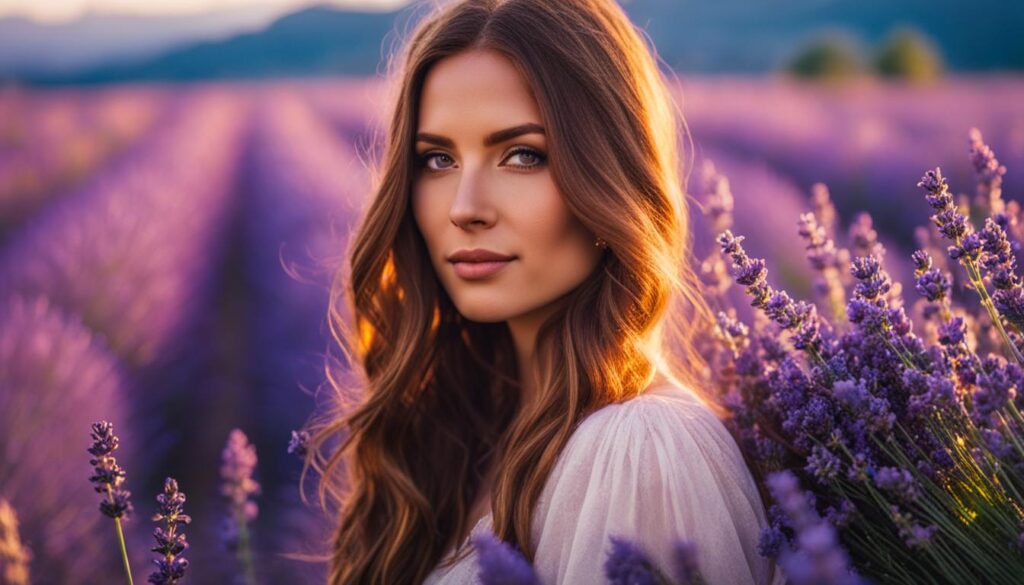
Ready to try DIY hair perfumes? Check out the next section for a simple homemade hair perfume recipe with essential oils!
Tips for Creating Your Own DIY Hair Perfume Blend
When it comes to creating your own DIY hair perfume blend, the possibilities are endless. Experimenting with different essential oils and combinations is the key to finding your perfect scent. Here are some tips to help you get started:
- Choose essential oils that you enjoy and that have beneficial properties for the hair. Some popular choices include lavender for relaxation, rosemary for scalp stimulation, and chamomile for soothing the scalp.
- Play around with different ratios of top, middle, and base notes to achieve the desired scent. Top notes are the initial burst of fragrance, middle notes provide body and balance, and base notes linger for a longer period of time.
- Don’t be afraid to try new combinations. Mix and match different essential oils to create unique and captivating blends. Trust your nose and follow your intuition when experimenting.
- Adjust the blend to your personal preference. Add more or less of certain essential oils to create a scent that is just right for you. Remember, it’s all about finding a fragrance that makes you feel confident and beautiful.
- Keep a record of the blends you create. Write down the essential oils and ratios you used so you can replicate or alter them in the future. This way, you can refine your blends over time and create signature scents that are truly unique to you.
Creating your own DIY hair perfume is a creative and personal process. Embrace the joy of experimentation and have fun discovering the perfect blend that reflects your personal style and enhances your hair care routine.
Homemade Herbal Hair Perfumes for Different Hair Types
Creating your own homemade herbal hair perfumes allows you to customize the scents to suit your specific hair type and address any particular concerns you may have. By selecting the right essential oil blends, you can enhance the effectiveness of your hair care routine and enjoy the benefits of natural fragrance. Here are some recommended essential oil blends for different hair types:
Dry Hair:
- Lavender: Provides nourishment and promotes hair growth.
- Rosemary: Moisturizes the scalp and strengthens the hair.
- Chamomile: Soothes the scalp and adds shine to the hair.
Oily Hair:
- Tea Tree: Balances the scalp and reduces excess oil production.
- Lemon: Cleanses the scalp and clarifies the hair.
- Peppermint: Refreshes the scalp and provides a cooling sensation.
Damaged or Brittle Hair:
- Ylang Ylang: Strengthens the hair and adds volume.
- Rose: Repairs and nourishes damaged hair.
- Sandalwood: Restores moisture and prevents breakage.
Blend these essential oils according to your preference and hair type to create your own unique herbal hair perfume. Remember to dilute the essential oils with an appropriate carrier ingredient and store the perfume in a dark, glass bottle for optimal preservation.
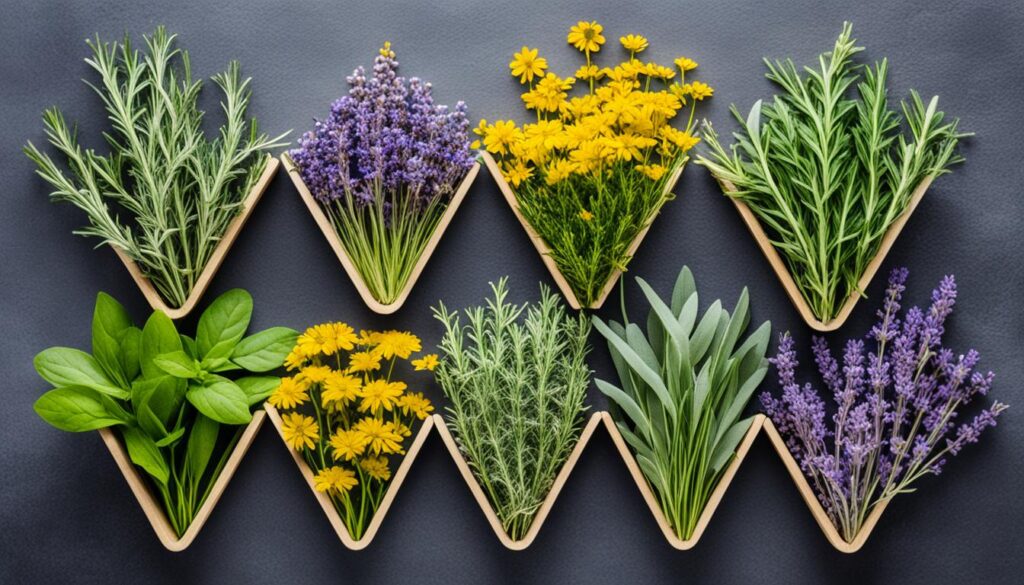
Experiment with different blends, and find the perfect combination that leaves your hair smelling heavenly and offers additional nourishing benefits. Incorporate these homemade herbal hair perfumes into your hair care routine to enhance the health and fragrance of your locks.
Conclusion
DIY herbal hair perfumes offer a customizable and natural alternative to commercial perfumes. With the use of essential oils and carrier ingredients, you can create personalized scents that not only provide a natural fragrance but also offer nourishing benefits for your hair. By making your own hair perfume, you have the power to avoid the drying effects of alcohol-based commercial perfumes and the potential toxicity of their ingredients.
Essential oils used in DIY hair perfumes provide a holistic approach to hair care, as they not only smell great but also have various benefits for your hair. By experimenting with different essential oil blends, you can find the perfect combination that suits your preferences and addresses your specific hair needs. Whether you have dry, oily, or damaged hair, there is a DIY hair perfume recipe that can enhance your hair care routine.
Enjoy the freedom of creating your own natural fragrance with DIY herbal hair perfumes. Say goodbye to generic and potentially harmful commercial perfumes, and embrace the nourishing benefits of homemade scents. Take control of your hair care and indulge in the beauty of customizable and homemade hair perfumes.
FAQ
What is hair perfume?
Hair perfume is a product specifically designed to add fragrance to hair. It can be used to freshen up unwashed hair or to enhance the scent of freshly cleaned locks.
Why are commercial perfumes not ideal for use on hair?
Commercial perfumes are not ideal for use on hair due to their high alcohol content, which can dry out the hair.
What are DIY herbal hair perfumes?
DIY herbal hair perfumes are homemade hair scents made using essential oils and carrier ingredients, providing a natural and non-toxic alternative.
What are the benefits of DIY herbal hair perfumes?
DIY herbal hair perfumes provide a natural fragrance while avoiding the drying effects of alcohol-based commercial perfumes. Essential oils used in DIY hair perfumes also offer nourishing benefits for the hair.
How do I choose essential oils for DIY hair perfumes?
When choosing essential oils for DIY hair perfumes, it is important to consider their nourishing benefits for the hair and their classification into top, middle, and base notes.
What are the carrier ingredients used in DIY hair perfumes?
Carrier ingredients such as vodka, witch hazel, aloe vera gel, or jojoba oil can be used to dilute the essential oils and create a hair perfume spray.
How do I make a homemade hair perfume with essential oils?
To make a homemade hair perfume, combine essential oils of your choice, a carrier ingredient, and distilled water or rose water. Transfer the mixture to a dark, glass bottle and shake before each use.
How do I use DIY herbal hair perfumes?
Simply shake the bottle gently before each use and apply the hair perfume spray to the lengths of hair as desired. It can be used on both wet and dry hair.
What are the advantages of DIY hair perfumes over commercial perfumes?
DIY hair perfumes are alcohol-free and offer a non-toxic alternative as they are made from natural ingredients. The essential oils used in DIY hair perfumes also have nourishing properties for the hair.
What tips can help me create my own DIY hair perfume blend?
When creating your DIY hair perfume blend, have fun experimenting with different essential oils and combinations. Keep a record of the blends you create and adjust them to your personal preference.
How can I customize homemade herbal hair perfumes for different hair types?
Homemade herbal hair perfumes can be customized by choosing essential oil blends that are suitable for different hair types and address specific hair concerns such as dryness, oiliness, or damage.
